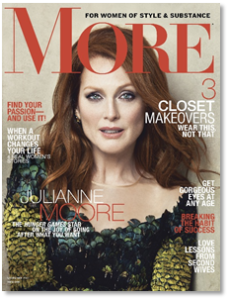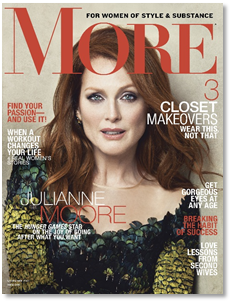 That was the outspoken and smartly opinionated Alec Baldwin on co-star and friend Julianne Moore, the latest Best Actress Academy Award winner for her award-winning role in Still Alice which was featured in the November 2014 issue of MORE magazine.
That was the outspoken and smartly opinionated Alec Baldwin on co-star and friend Julianne Moore, the latest Best Actress Academy Award winner for her award-winning role in Still Alice which was featured in the November 2014 issue of MORE magazine.
Here’s some moore:
On how her kids influenced her signing on for Mockingjay: “For a child moving into adolescence, the big question is, Do I have free will? Can I determine my own future?” she says. “[At that age] you’re still with your parents. But you’re asking yourself, Who am I?” Most of the films I make are not for kids. My son was in line for the midnight show when The Hunger Games first came out. They both loved the books. For them, my being in Mockingjay was fairly meaningful.”
Alec Baldwin on why Moore is “Unstoppable”:
“A lot of people work when they’re young and then their lives evolve. Some of them drop off or only work now and then. Then there are women like Julie: They get married, have a family and do remarkable work year after year. It’s hard for men to do that, but it’s even harder for women. She’s unstoppable that way.”
Moore’s take on her five most memorable on-screen characters:
AMBER WAVES, Boogie Nights (1997). “She has a lot of sexual power, but she’s powerless economically, so ultimately she doesn’t have a lot of choice.”
MAUDE LEBOWSKI, The Big Lebowski (1998). “Her power comes from her social hierarchy: She’s wealthy and a member of the 1 percent.”
JULES, The Kids Are All Right (2010). “She has a lot of authority within her family, but now that her kids are growing up, she feels like she’s losing her position.”
SARAH PALIN, Game Change (2012). “She came into the election with the kind of charisma that people don’t often see in politics. But ultimately she was at the behest of the Republican Party.”
ALMA COIN, The Hunger Games: Mockingjay (2014). “She is about political power— how you wield it and what you are trying to gain.”
On Phillip Seymour Hoffman: When asked about her old friend—Moore worked with Hoffman on three other films, Magnolia, Boogie Nights and The Big Lebowski—her face becomes flushed with emotion. “What is there to say? It was a terrible, ridiculous, untimely loss. It’s difficult,” she says, her voice tightening, “because I’m not sure how his family wants to deal with all this. It’s not my place. But I can talk about him as a colleague: He was an extraordinary talent and a lovely human being.”
How being older has changed her views on Hollywood and the choices she makes: “I used to think, Life’s really challenging. Things are tough, so they should be tough in a book, in a movie. They should be sad,” she says. “But the older I get, the more I like happy endings.”
“When you’re starting out in this business, you feel like you’re not in charge, that you’re still looking to the world for a kind of validation. But as you get older, you realize that direction comes from yourself, from your own desires and responsibilities. You choose your work. You choose your life. That’s where your power comes from—and that’s a great feeling.”
What Julianne would do more of if she could start over: “Skiing. I’m terrified of skiing and I can’t get over the hump.”

